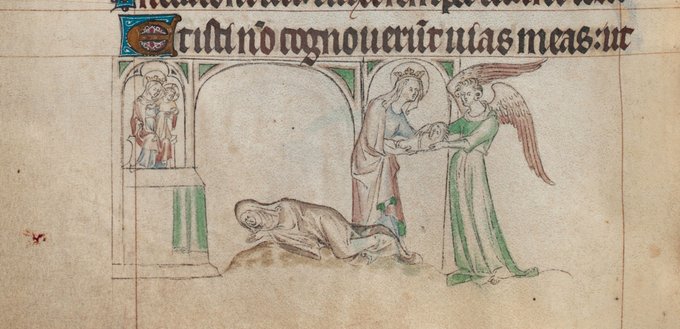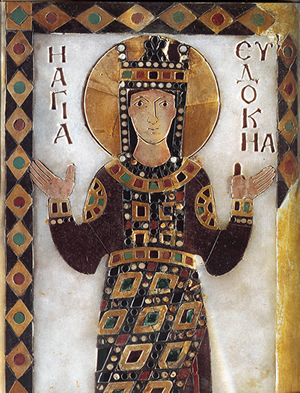 The Virgin Mary saves a pregnant abbess and gives the infant to an angel, 1310-20, English, Queen
Mary Psalter. London, British Library, Royal MS 2 B VII, f. 208v (Source: Medieval
Manuscripts@BLMedieval on X)
The Virgin Mary saves a pregnant abbess and gives the infant to an angel, 1310-20, English, Queen
Mary Psalter. London, British Library, Royal MS 2 B VII, f. 208v (Source: Medieval
Manuscripts@BLMedieval on X)
1) Nigel of Canterbury. Miracles of the Virgin. Tract on Abuses. Edited and translated by
Jan M. Ziolkowski and Ronald E. Pepin. Dumbarton Oaks Medieval Library, 75. Harvard University Press,
2022. ISBN 9780674660267 (print)
"The first English translation of the earliest Latin poems about miracles performed by the Virgin Mary,
composed in twelfth-century Canterbury by a Benedictine monk who inspired Chaucer.
Nigel (ca. 1135-1198), a Benedictine monk at Christ Church in Canterbury, is best known for The
Mirror of Fools—a popular satire whose hero Burnellus the Ass is referenced in Chaucer's
Canterbury Tales. Nigel's oeuvre also includes other important poems and hagiography.
The Miracles of the Virgin is the oldest Latin poem about miracles performed by Mary. This
collection features seventeen lively tales in which the Virgin rescues a disappointed administrator from
a pact with the devil, has a Roman emperor killed by a long-dead martyr, saves a Jewish boy from being
burned alive, and shields an abbess from the shame of pregnancy. Each story illustrates the
boundlessness of Mary's mercy. In the Tract on Abuses, a letter that resembles a religious
pamphlet, Nigel rails against ecclesiastical corruption and worldly entanglements.
Alongside authoritative editions of the Latin texts, this volume offers the first translations of both
works into English." — [Reproduced from the publisher's website]
2) Ziolkowski, Jan M. A Commentary on Nigel of Canterbury's Miracles of the Virgin.
Supplement to Dumbarton Oaks Medieval Library, 75. Harvard University Press, 2023. ISBN 9780884024941
(print)
"Nigel of Canterbury, also known as Longchamp and Whiteacre, wrote toward the end of the so-called
Twelfth-Century Renaissance. He was a Benedictine monk of Christ Church when Thomas Becket was martyred,
and a star of Anglo-Latin literature while the Angevin kings held sway over a vast empire that
encompassed not only the British Isles but also western France.
The Dumbarton Oaks Medieval Library volume features, alongside the Latin, the first-ever English
translation of Nigel's second-longest poem, Miracles of the Virgin. The
Miracles is the oldest extant collection of versified miracles of Mary in Latin and indeed
in any language. The seventeen narratives, telling a gamut of tales from diabolic pacts to pregnant
abbesses, gave scope for Nigel to display skills as a storyteller and stylist, while recounting the
miraculous mercy of the Virgin. This supplement offers an extensive commentary to facilitate
appreciation of the Miracles as poetry by a medieval writer deeply imbued in the long
tradition of Latin literature." — [Reproduced from the publisher's website]
 Indexers select a translation each month that is
significant in the ideas it presents. This gives users an opportunity to see a range of newly
translated medieval works of importance for women's and gender studies. It also will build an archive
of references to translations that will be useful as classroom readings.
Indexers select a translation each month that is
significant in the ideas it presents. This gives users an opportunity to see a range of newly
translated medieval works of importance for women's and gender studies. It also will build an archive
of references to translations that will be useful as classroom readings.
Depending upon the content, an entire work may be indexed as a single title like the vita of a
saint or the collected cartularies of a countess. But in many cases the translation deals only in part
with issues involving women and gender. In those instances, indexing goes to a deeper level,
identifying and describing specific sections within a text. For example, there are 93 records for
pertinent sections in the Siete Partidas.
To see more translations, go to the Advanced Search Page and put
"Translation" in the Article Type box. Add specific terms to Keyword,
Century or Geographical Area as needed.
There are currently over 3000 records for translations in Feminae. There are also over 500 records for
editions in original languages.
Feminae welcomes unpublished translations and editions that authors may wish to make available.